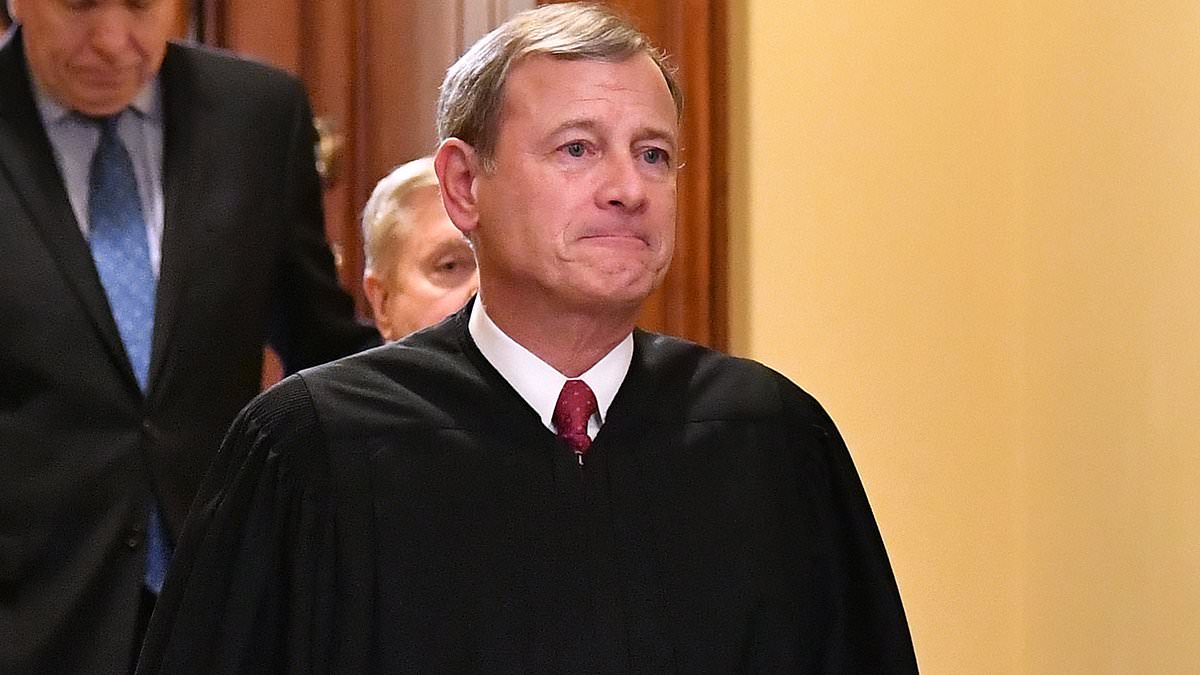Supreme Court Chief Justice John Roberts issued a stark warning ahead of Donald Trump’s second term in the White House.
In his annual report on the federal judiciary, which was released Tuesday, the chief justice argued that the United States must maintain ‘judicial independence,’ as he wrote about the threats to the federal judicial system.
‘It is not in the nature of judicial work to make everyone happy. Most cases have a winner and a loser,’ Roberts wrote in the 15-page report, according to Fox News.
‘Every Administration suffers defeats in the court system – sometimes in cases with major ramifications for executive or legislative power or other consequential topics.
‘Nevertheless, for the past several decades, the decisions of the courts, popular or not, have been followed and the Nation has avoided standoffs that plagued the 1950s and 1960s,’ he noted.
‘Within the past few years, however, elected officials from across the political spectrum have raised the specter of open disregard for federal court rulings.’
Roberts did not name Trump, President Joe Biden or any other lawmaker in his report, despite public spats with both executives.
‘These dangerous suggestions, however sporadic, must be soundly rejected. Judicial independence is worth preserving,’ Roberts argued.
He went on to quote late Justice Ruth Bader Ginsburg, who he said argued that an independent judiciary is ‘essential to the rule of law in any land’ but is ‘vulnerable to assault; it can be shattered if the society law exists to serve does not take care to assure its preservation.’
‘I urge all Americans to appreciate this inheritance from our founding generation and cherish its endurance,’ Roberts wrote.
He also quoted the former Chief Justice Charles Evans Hughes, who once remarked that the three branches of government ‘must work in successful cooperation’ to ‘make possible the effective functioning of the department of government, which is designed to safeguard with judicial impartiality and independence the interests of liberty.’
‘Our political system and economic strength depend on the rule of law,’ Roberts said.
The chief justice went on to explain that the judiciary is under threat from intimidation and disinformation.
‘Violence, intimidation and defiance directed at judges because of their work undermine our Republic and are wholly unacceptable,’ he said, arguing that not everyone engages in ‘”informed criticisms” or anything remotely resembling it.’
He agued that ‘attempts to intimidate judges for their rulings in cases are inappropriate and should be vigorously opposed,’ and noted that while public officials and others can criticize rulings, they should also be aware that their comments can ‘prompt dangerous reactions by officials.’
Disinformation on social media can magnify these distortions and even be exploited by ‘hostile foreign state actors’ to exacerbate divisions.
In some cases, Roberts noted, judges have even had to wear bulletproof vests at public events, according to the New York Times.
Threats targeting federal judges have more than tripled over the last decade, according to US Marshals Service statistics.
State court judges in Wisconsin and Maryland were even killed at their homes.
‘Violence, intimidation and defiance directed at judges because of their work undermine our Republic and are wholly unacceptable.’
The remarks came after an eventful year for the Supreme Court, with Roberts issuing a landmark decision over the summer when the highest court ruled that the president of the United States has immunity from prosecution for official acts in office.
Republicans touted that ruling – and another that halted efforts to disqualify Trump from the ballot in Colorado – as major victories for the former president ahead of his victory.
Democrats, however, including President Biden, criticized the highest court for its ruling in the immunity case – and Biden even wound up calling for term limits in the aftermath, as well as an ethics code following reports of undisclosed trips and gifts from wealthy benefactors.
Yet Roberts and Trump also clashed in 2018, when the chief justice rebuked the then-president for denouncing a judge who rejected his migrant asylum policy as an ‘Obama judge.’
The Supreme Court is now expected to hear arguments next week on the constitutionality of a law that could ban TikTok.
Trump pleaded with the Supreme Court to halt the implementation of the Protecting Americans from Controlled Applications App, which would ban the video-sharing app by January 19 if it is not sold by its Chinese parent company by then.
The incoming president’s controversial conservative agenda is also likely to be legally challenged and end up before the nation’s highest court, whose conservative majority includes three justices appointed by Trump during his first term.
